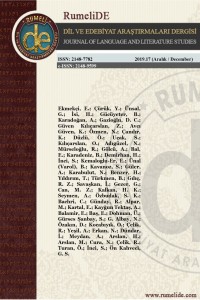Contextualizing the representation of modern Turkish women through a fictional autobiography: Memoirs of Halide Edib
Abstract
Edward Said’s work Orientalism- one of the most influential works in post-colonial studies in decades- identified and critiqued how the West positioned itself in a superior position to the East through a series of mechanisms. Despite the fact that the book is attuned to issues of gender and sexuality, it is not a work of feminist scholarship or theory. Rather, it broaches the issue of sexuality as one in which the Western “male” gaze dominates the East, which is perceived as inherently “female.” Halide Edib’s autobiographical work, especially the part which covers her childhood stories, is full of evident which shows the representation of “oriental women” in the Ottoman Empire. In additionally, it shows how during the modernization policy in the beginning of the Turkish Republic, Turkish women took initiatives towards gender equality. By focusing on Halide Edib’s fictional autobiography, Memoirs of Halide Edib, it will be attempted to contextualize how Halide Edib became a pioneering figure and represented “modern Turkish women.” By doing this, Said’s depiction of the Western conception of “oriental women” will eventually be refuted by providing Halide Edib as an example.
References
- Ahmed, L. (1992). Women and Gender in Islam: Historical Roots of a Modern Debate. Chelsea: Michigan. Basmaz, Ö. (2008). "The Rebellious Daughter of the Republic” or “The Mother of the Turks”: Reconsidering the Late Ottoman Empire and the Early Turkish Republic Through the Politics of Halide Edip Adivar." MA Thesis. University of Akron. Edib, Halide. (1926). Memoirs of Halide Edib. New York: The Century co. Grace, D. (2004). The Woman in the Muslin Mask: Veiling and Identity in Postcolonial Literature. London: Pluto Press. Gulendam, Ramazan. (2007). “Turkish Women in the Novels of some Turkish Female Writers (1839- 1930).” SDU Fen Edebiyat Fakultesi Sosyal Bilimler Dergisi 16: 179-200. Jouhki, J. (2006). Imagining the Other Orientalism and Occidentalism in Tamil-European Relations in South India. University of Jyväskylä. Mashirul, H. (2000). Between Modernity and Nationalism. New Delhi: Oxford University Press. Okur, N. A. (2005). “The Demise of the Great Mother: Islam, Reform, and Women’s Emancipation Movement in Turkey.” Gender Issues 22: 6-28. Ortaylı, İ. (2014). “Halide Edip Adivar.” Milliyet, January 26. Peirce, L. P. (2008). "Beyond harem walls: Ottoman royal women and the exercise of power." In Servants of the dynasty: palace women in world history, edited by Anne Walthall, 81-95. Berkeley: University of California Press. Said, E. (1979). Orientalism. New York: Vintage. Sönmez, E. (1973). "The Novelist Halide Edib Adivar And Turkish Feminism." Welt Des Islams 14 : 81-115. Turkish Cultural Foundation-Literture. “Halide Edip Adivar (1882-1964).” Turkish Cultural Foundation. http://www.turkishculture.org/pages.php?ChildID=125&ParentID=3&ID=4&ChildID1=246&miMore=1 (accessed February 25, 2014).
Modern Türk kadını temsilinin kurgusal bir otobiyografi üzerinden bağlamlaştırılması: Mor Salkımlı Ev (Halide Edib’in Anıları)
Abstract
Edward Said’in, sömürge sonrası (post-koloniyal) çalışmalarda yıllardır en etkili eserlerinden biri olan Oryantalizm’deki tespitleri, “Batı”nın bir dizi mekanizma ile kendisini “Doğu”ya üstün bir pozisyonda nasıl konumlandırdığını belirler ve eleştirir. Bununla birlikte kitap aslında cinsiyet ve cinsellik konuları hakkında bir fikir vermesine rağmen, feminist bir teori ya da alan kitabı olarak değerlendirilmez. Daha ziyade cinsellik meselesini Batılı “erkek” bakış açısının, doğası gereği “kadın” olarak algılanan Doğu’ya egemen olduğu bir konu olarak ele alır. Halide Edib’in otobiyografik çalışması, özellikle de çocukluk hikayelerini kapsayan kısmı, Osmanlı İmparatorluğu’nda “oryantal kadın” ların temsilini açıkça ortaya koymaktadır. Ayrıca, Türkiye Cumhuriyetinin kuruluş yıllarındaki modernleşme politikası sırasında, Türk kadınların cinsiyet eşitliğine yönelik birçok girişimde bulunduğunu açıkça göstermektedir. Bu makalede Halide Edib’in kurgusal otobiyografisi olan Mor Salkımlı Ev’e (Halide Edib’in Anıları) odaklanılarak Halide Edib’in nasıl öncü bir figür haline geldiği ve “modern Türk kadınını” nasıl temsil ettiği bağlamsallaştırılmaya çalışılacaktır. Bunu yaparken de Edward Said’in Batı’daki “oryantal kadın” anlayışı ve betimlemesi, Halide Edib’in aksi bir örnek gösterilmesi nedeniyle reddedilecektir.
References
- Ahmed, L. (1992). Women and Gender in Islam: Historical Roots of a Modern Debate. Chelsea: Michigan. Basmaz, Ö. (2008). "The Rebellious Daughter of the Republic” or “The Mother of the Turks”: Reconsidering the Late Ottoman Empire and the Early Turkish Republic Through the Politics of Halide Edip Adivar." MA Thesis. University of Akron. Edib, Halide. (1926). Memoirs of Halide Edib. New York: The Century co. Grace, D. (2004). The Woman in the Muslin Mask: Veiling and Identity in Postcolonial Literature. London: Pluto Press. Gulendam, Ramazan. (2007). “Turkish Women in the Novels of some Turkish Female Writers (1839- 1930).” SDU Fen Edebiyat Fakultesi Sosyal Bilimler Dergisi 16: 179-200. Jouhki, J. (2006). Imagining the Other Orientalism and Occidentalism in Tamil-European Relations in South India. University of Jyväskylä. Mashirul, H. (2000). Between Modernity and Nationalism. New Delhi: Oxford University Press. Okur, N. A. (2005). “The Demise of the Great Mother: Islam, Reform, and Women’s Emancipation Movement in Turkey.” Gender Issues 22: 6-28. Ortaylı, İ. (2014). “Halide Edip Adivar.” Milliyet, January 26. Peirce, L. P. (2008). "Beyond harem walls: Ottoman royal women and the exercise of power." In Servants of the dynasty: palace women in world history, edited by Anne Walthall, 81-95. Berkeley: University of California Press. Said, E. (1979). Orientalism. New York: Vintage. Sönmez, E. (1973). "The Novelist Halide Edib Adivar And Turkish Feminism." Welt Des Islams 14 : 81-115. Turkish Cultural Foundation-Literture. “Halide Edip Adivar (1882-1964).” Turkish Cultural Foundation. http://www.turkishculture.org/pages.php?ChildID=125&ParentID=3&ID=4&ChildID1=246&miMore=1 (accessed February 25, 2014).
Details
| Primary Language | English |
|---|---|
| Subjects | Creative Arts and Writing |
| Journal Section | Turkish language, culture and literature |
| Authors | |
| Publication Date | December 21, 2019 |
| Published in Issue | Year 2019 Issue: 17 |

